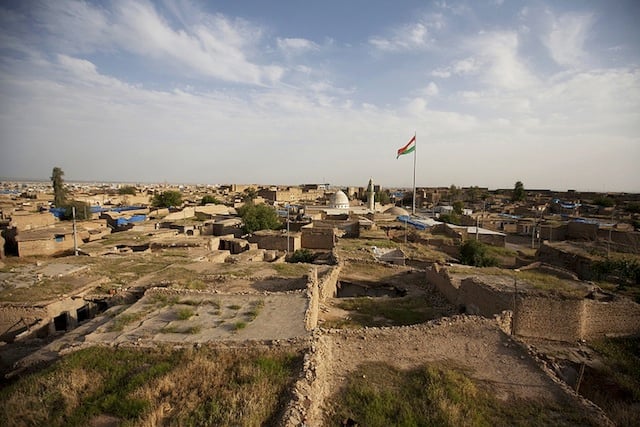
The Kurdish flag flies at full staff over the Iraqi Kurdistan capital of Erbil (Photo: james_gordon_losangeles via Flickr).
To the south, Iraqi Kurdistan sees an unstable Baghdad struggling to maintain control against a violent insurgency, all the while seeking to exert control over the Kurdish region’s vast oil wealth. It is to the west, though, where Kurds see a brighter future, eyeing the opportunity for independence through a pipeline to Turkey to sell their own oil supply.
With a population around 30 million, the Kurds are an ethnic minority group dispersed throughout Iran, Iraq, Syria and Turkey. The Kurds, who have never had legal borders to call their own, have a long history as victims of oppression in the region. No event better exemplifies this than Saddam Hussein’s gas attack in 1988 that left 5,000 dead at Halabja. Since the massacre, Kurds have maintained an autonomous region in northern Iraq where they govern themselves but are dependent on Baghdad for income in exchange for their oil.
After completing an oil pipeline to Turkey in 2013, the Kurdistan Regional Government (KRG) is hoping to use this as a tool for greater independence.
For years, Kurds have trucked away about 30,000 barrels of oil per day to Turkey, and Iraq’s central government has turned a blind eye because of the small amount and a rising insurgency keeping it busy. When the pipeline is running at full capacity, it should be able to transport up to 400,000 barrels a day. That amount of revenue, upwards of $40 million in today’s market, is enough to make Baghdad draw the line on the KRG’s personal export ventures.
Iraq, the eighth-highest oil-producing country in the world, has always claimed ownership of oil in Kurdish areas. Under the Iraqi constitution, Kurds are allotted 17 percent of Iraq’s total revenue, 95 percent of which is oil-related, but must turn over oil discovered and drilled in its territory.
One senior Iraqi lawmaker said the country is as much dependent on Kurdish oil as the Kurds are dependent on Iraq’s revenue allotment. He said Iraq’s annual budget would “collapse” if the Kurds withheld its oil export payments and continued to receive 17 percent of Iraq’s income.
Although Kurdish oil is collecting in the Turkish port of Ceyhan, Baghdad has put a halt to any sales. Through legal action, Iraq’s central government promises it will sue any company that purchases “smuggled” oil from its northern territory. This threat has slowed the KRG from inking potentially lucrative deals with major oil companies from the U.S. and around the world.
Iraq’s oil minister, Abdul Kareem Luaibi, told Reuters that exporting oil drilled within its borders is considered “meddling in the division of Iraq” and says, “This is a red line.”
“All companies…were notified not to deal with the (Kurdish) region to buy any quantity of oil which is considered as smuggled,” Luaibi said.
Another fear for Baghdad is that other oil-rich regions in their country will see the Kurds initiative and push for greater independence, further destabilizing the country.
All of this is happening while Baghdad is trying to maintain control over Sunni extremists from the Islamic State of Iraq and the Levant (ISIS), a group that’s achieved notoriety for its unabashed use of violence in Syria. In 2013, ISIS helped claim around 7,800 lives in Iraq — its deadliest year since 2008.
This instability is one reason Iraqi Kurdistan wishes to maintain distance from the central government to the south. Aside from a series of bombings on September 29 in the Kurdish capital of Erbil, the KRG has been able to maintain a sense of security for its people.
Many in the Kurdish population hope the pipeline is the first step in a future of economic independence.
In the past, Kurds have had to pay oil companies out of their own pockets for discovery and drilling. These costs ate away at the 17 percent allowance of Iraqi income. Skipping over Iraq’s export infrastructure, the KRG has recently signed more than 50 contracts with companies such as Exxon Mobil and Chevron. However, these deals hold no value and no drilling will take place until the companies can be reassured there will be no legal retribution from Baghdad.
Michael Knights, a Lafer fellow of The Washington Institute, said in a recent report that the Kurd’s push for independence is not just about oil. Knights said the desire for self-government comes from “decades of brutal oppression by the Iraqi government.”
After they received self-governance in northern Iraq in the early 1990s, Kurds have developed their own identity. Iraqi Kurdistan provides its own public services, commands its own army, and flies the Kurdish flag over its government buildings.
According to Knights, Baghdad’s latest offer for an agreement now rests in the KRG’s hands. Some key points of the agreement include: a joint marketing agreement between Iraq and the KRG’s oil marketing organizations, revenue passing through Baghdad and then into the KRG’s account, and revenue sharing in the form of reducing expenses to increase the KRG’s 17 percent allotment by $2.5 billion.
Knights said there is “no real downside if they accept the agreement for an interim period” to monitor how it is implemented.
Even if their economic future is tied to Baghdad for now, Kurds still appear to be aiming for complete independence in the future.
“Independence is an aspiration in the heart of every Kurd,” a senior Kurdish official told the Washington Post, speaking on the condition of anonymity because of political sensitivities. “But we need to be strategic.”